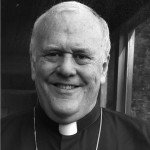GlobalView from Bishop Bill Atwood
After years of testing, physicals, and medical reviews, I was finally released by the FAA to pilot planes again. Because they date the approval from when the formal paperwork was submitted, the one year clearance was dated October 2015, so it will run out in October of 2016. I have been assured that the process is much less cumbersome to renew it than it was to get it approved.
Over the last few weeks, I’ve been flying a spiffy Beechcraft Bonanza (six place 200 mph plane) after a very long time out of the cockpit.
Though some of the radar procedures have changed, it still works that “when you pull back on the yoke, the houses below you look smaller.” Of course, there are emergency procedures to learn and specifications to study—and they need to be learned even though I don’t have a lot of time to devote to studying! As I have been getting back into it, lots of former Air Force training has bubbled up as though I had been flying all along.
One of the key things in flying has to do with emergency procedures. For virtually every aircraft, there are three things to remember when training for, or dealing with emergencies. They are:
- Maintain aircraft control.
- Analyze the situation and take proper action.
- Land as soon as practical.
It doesn’t help to analyze the problem if one does not maintain aircraft control and the plane winds up angering in to the ground!
You don’t have to look too far to find reports or articles about problems in the world and in the church. List analysts would agree that the current social climate is challenging to the church. They would also readily admit that although there are some areas of success and health, in general, the influence of the church is shrinking in the West. At least for the current season, liberal activists have pretty much succeeded in getting historic Christian teaching branded as hateful and intolerant.
This has happened, Christian apologist Lance Wallnau says, because we have been doing the wrong things. The focus of the church has been just on evangelism. He says that the goal of most active evangelical churches is to proclaim the Gospel of Salvation. But it was not just the Gospel of Salvation that Jesus told us to proclaim, but the Gospel of the Kingdom! Of course salvation and eternal life are part of the message of the Kingdom over which we have been given stewardship, but that is not the whole message. Basically, the message of the Kingdom of God is for us to work to extend the Kingdom—“Thy Kingdom come on earth as it is in heaven.”
In the best of our churches, we are working to see that people come to faith and are saved. But that is not enough. Liberal emissaries have succeeded in taking the “high ground” in media and government. They are going after the family as fast as they can. Even though we have made lots of Christians, but that has not impacted the culture. Remember I have quoted the statistics that only half of evangelical Christians register to vote and then only half of the registered ones vote. That means that only 24-25% of Evangelical Christians are actually voting. No wonder an unBiblical world view advances.
We can’t stop ministry to analyze the problem. We still need to be doing outreach, evangelism, worship, etc. That is “Maintaining aircraft control.” But now, we need to “analyze the situation and take proper action.” The situation is that the Church is not deploying discipled believers into the spheres of influence in the culture. We are mostly seeing our job as bringing people to faith and then discipling them in the things of the church and the Word, but not in how to engage the world. What does it mean to be a disciple in today’s world? Is it enough to be kind and not cheat? Not if we are going to be found faithful in advancing the Kingdom of God. The Kingdom of God is where His Dominion is. Dominion is another word for Lordship. In other words, the Kingdom of God is where God’s will is done.
In 1977 in Uganda, when Idi Amin was in power, Archbishop Janani Luwum told his bishops that he was going to confront the dictator. They said, “If you do that you will be killed.”
“Of course,” he replied, “But it must be done.” Shortly after that, Luwum was arrested and his house searched for what the government said were weapons. Of course there were none, but he was tried anyway. Convicted on the evidence of an unseen document, he was never able to answer the charges. He was led away and never seen again alive. There were government reports that there had been a car wreck which killed him. His sealed casket was sent to his home village for burial. It was pried open revealing bullet holes in his body. He was killed, but Amin’s power spiraled downward until he had to flee the country.
On the 30th of May in 1998, Nigerian, Archbishop Joseph Adeteloye confronted the military dictator Sani Abacha. Archbishop Joseph said, “If you do not repent, you will die within ten days.” Archbishop Joseph said that he was surprised that he was not arrested, but that his passport had been confiscated. On the tenth day, Abacha dropped dead in his house.
In Kenya, Archbishop David Gitari was well known for standing up against the government, even challenging the President, Daniel Arap Moi on numerous occasions. At first he would just joke about the President getting his messages by bugging the cathedral so they could listen in to his sermons. Archbishop David took great delight in joking about the situation. He would lean over and speak under his car seat or under his desk saying, “Hello, Moi! I know you are listening!” and then he would laugh and laugh. He was faithful over a very long time. Eventually Gitari said, “President Moi prays for my health! He knows that if anything ever happens to me he will be blamed!” When Kenya began working on a new Constitution, Archbishop David Gitari was tapped to write the section on Human Rights.
It is not that only Archbishops need to stand up and speak out. Indelibly discipled Christians should be equipped in the Church to go out into all the spheres of social influence: Government, Education, Media, Arts & Entertainment, Family, Business, and even into the church. The point though, is that it is not just the church where committed Christians should work to establish the Kingdom or at least move more closely toward it. It should be in every sphere of human endeavor. While Archbishops are particularly well suited to address things in their nations, they are by no means the only ones who should be speaking. Businessmen should have small groups for accountability and encouragement. The same is true in other areas where there are deep needs, like business and education.
Where disciples were going to preach, Jesus sent them out two by two. In today’s hostile environment in so many areas, we would be wise to follow suit, even working to deploy a small group (or recruit on inside the company or institution) so that there are people who can encourage each other and hold each other accountable.
A statistically tiny fraction of the population has been extremely successful in steering society (in many countries!) where they want things to go. If we don’t get smart and occupy some of the “gates” that are currently strongly under the influence of the evil one, we will never see any change. In fact, it will only get worse.
We have to “analyze the situation and take proper action.” It is not enough just to grow the size of our congregations (though we should work on that!). Neither is it enough to pursue evangelism, make better choirs, or be satisfied with other internal programs alone. Until we disciple and deploy solidly converted people and teams into the spheres of influence in the culture, we are going to continue to lose ground. We cannot be satisfied just to preach evangelism, or even just to pursue discipleship simply to shape what our people do inside the church. We have to re-shape our thinking so we properly equip disciples to GO into the world and help with extending the Kingdom.



